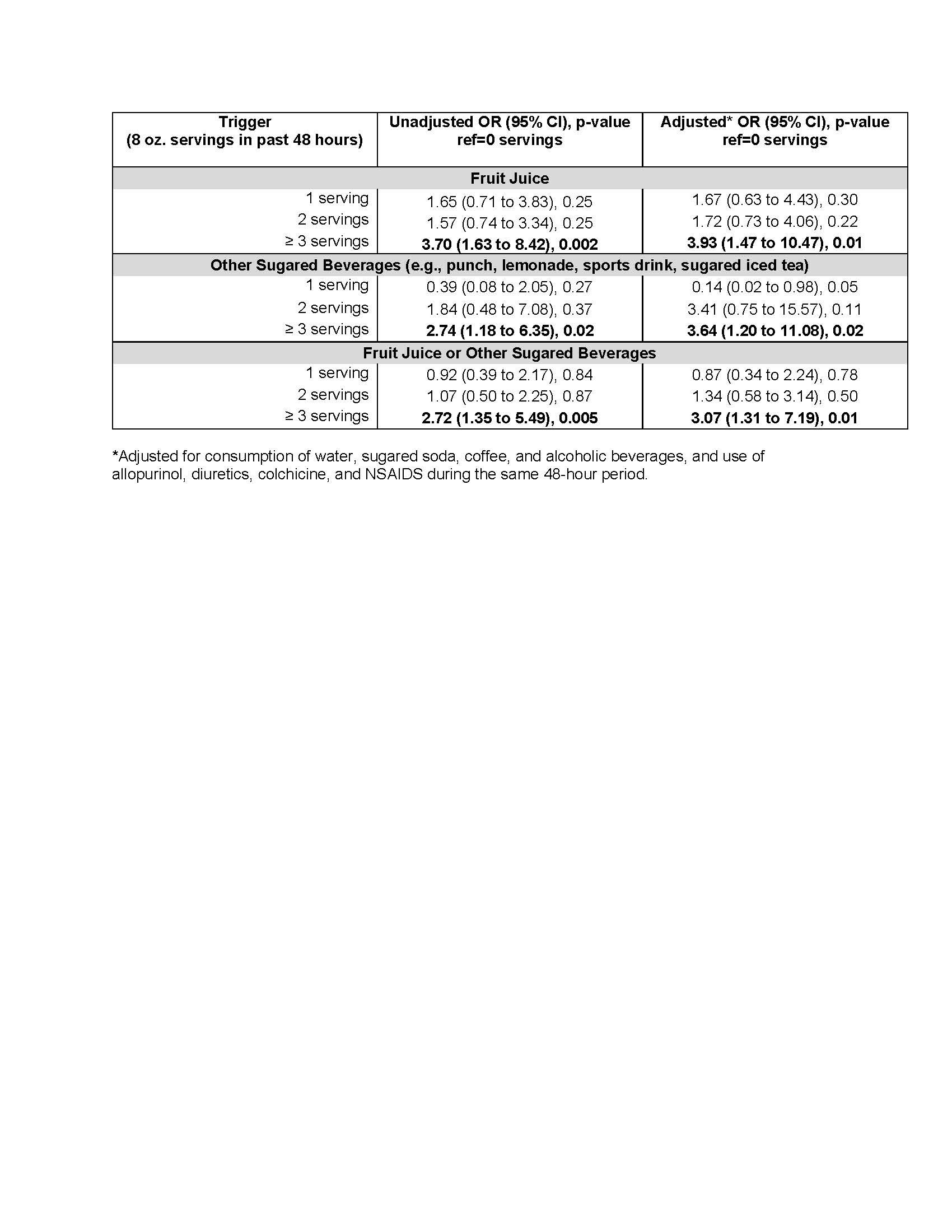Session Information
Date: Monday, November 14, 2022
Title: Metabolic and Crystal Arthropathies – Basic and Clinical Science Poster
Session Type: Poster Session D
Session Time: 1:00PM-3:00PM
Background/Purpose: Habitual fructose-rich beverage intake has been associated with increased serum urate (SU) levels and prevalent and incident gout. This is likely because fructose induces urate production by increasing ATP degradation to AMP. Episodic fructose-rich beverage intake may also trigger recurrent gout flares, since SU levels have been shown to increase within minutes of oral or IV fructose administration in human physiologic studies,1,2 particularly in people with gout.3 However, as mentioned in the 2020 ACR Guidelines for Gout Management, no data on fructose consumption are available for existing gout.4 We evaluated whether intake of fruit juice and other fructose-rich beverages was associated with risk for gout flares.
Methods: This case-crossover study used data collected prospectively from gout patients attending Rheumatology clinics at two US academic medical centres over 2019-2022 to evaluate risk factors for gout flares. Each participant acted as his/her own control, thus eliminating between-person differences. Participants logged on to the study website at times of gout flares and every 3 months during gout flare-free (control) periods to report on exposures, including diet and medications, during the 48 hours preceding the flare or control period.
We examined the relation of self-reported 8 oz. servings of fruit juices (orange, apple, or other) and other sugary beverages (e.g., punch, lemonade) in the prior 48 hours to the risk of gout flares using conditional logistic regression, adjusting for intake of water, sugared soda, coffee, and alcohol, and urate-lowering, diuretic, and flare prophylactic medications (NSAIDs, colchicine) during the same period.
Results: Of 862 people with gout in the study cohort, 126 had ≥ 1 gout flare during the study period and also completed ≥ 1 non-flare questionnaire (contributing a total of 157 flare periods and 317 control periods); 78% were male, mean age 58.0±17.3 years at enrollment. Higher intake of fruit juice and other sugary beverages were each associated with increased risk for gout flare (Table 1), even accounting for intake of other alcoholic and non-alcoholic beverages and medication use during the same period. Adjusted odds ratios (ORs) were 3.93 (1.47 to 10.47) for ≥3 servings of fruit juice (ref=0 servings), 3.64 (1.20 to 11.08) for ≥3 servings of other sugared beverages, and 3.07 (1.31 to 7.19) for ≥3 servings of either juice or other sugared beverages. Sugared soda consumption was uncommon (fewest number of relevant analytic pairs among beverages of interest in this cohort to date), limiting power for analyses as a flare trigger.
Conclusion: The study findings suggest that intake of fruit juices and other sugared beverages (e.g., punch, lemonade, sports drinks, sugared iced tea) both increased the risk of gout flares, in a dose-response manner. These findings could provide guidance to clinicians and patients about avoidance of high-fructose beverage consumption for prevention of both incident gout and gout flares.
References:
1. Dalbeth (2013) PMID 23349133
2. Fox (1972) PMID 5047915
3. Stirpe Lancet (1970) PMID 4098798
4. Fitzgerald (2020) PMID 32391934
To cite this abstract in AMA style:
McCormick N, Yokose C, Kohler M, Yinh J, Chen C, Neogi T, Merriman T, saag k, Zhang Y, Choi H. Effect of Short-Term Fruit Juice and Sugared Beverage Intake on Risk of Recurrent Gout Flares [abstract]. Arthritis Rheumatol. 2022; 74 (suppl 9). https://acrabstracts.org/abstract/effect-of-short-term-fruit-juice-and-sugared-beverage-intake-on-risk-of-recurrent-gout-flares/. Accessed .« Back to ACR Convergence 2022
ACR Meeting Abstracts - https://acrabstracts.org/abstract/effect-of-short-term-fruit-juice-and-sugared-beverage-intake-on-risk-of-recurrent-gout-flares/

